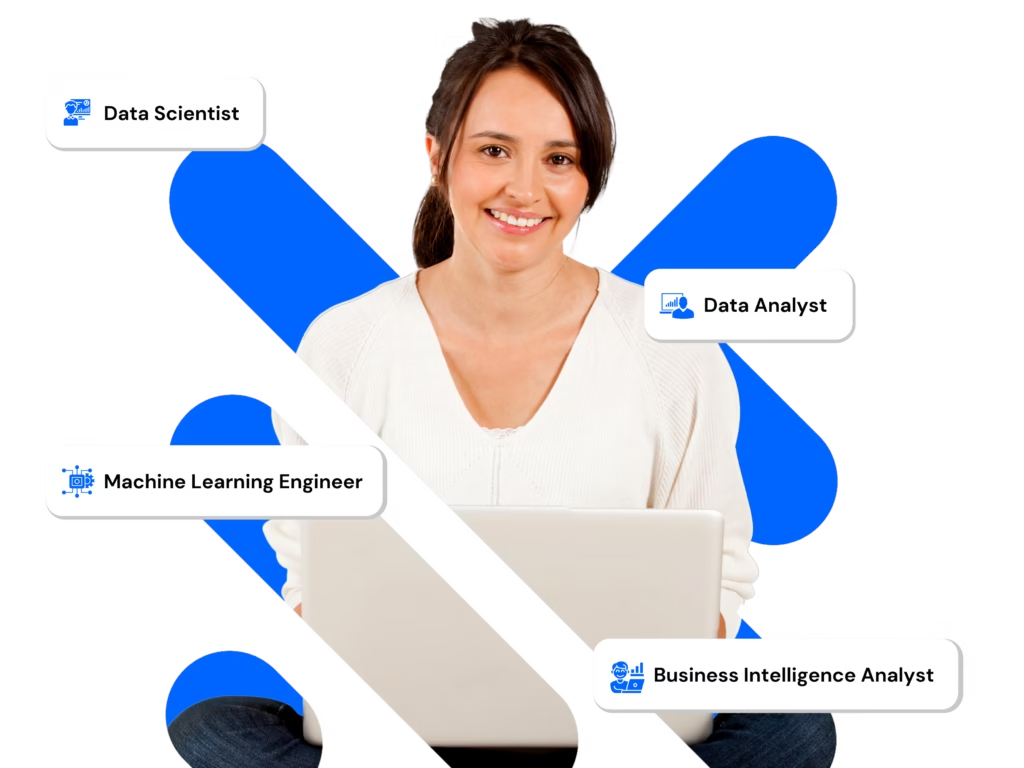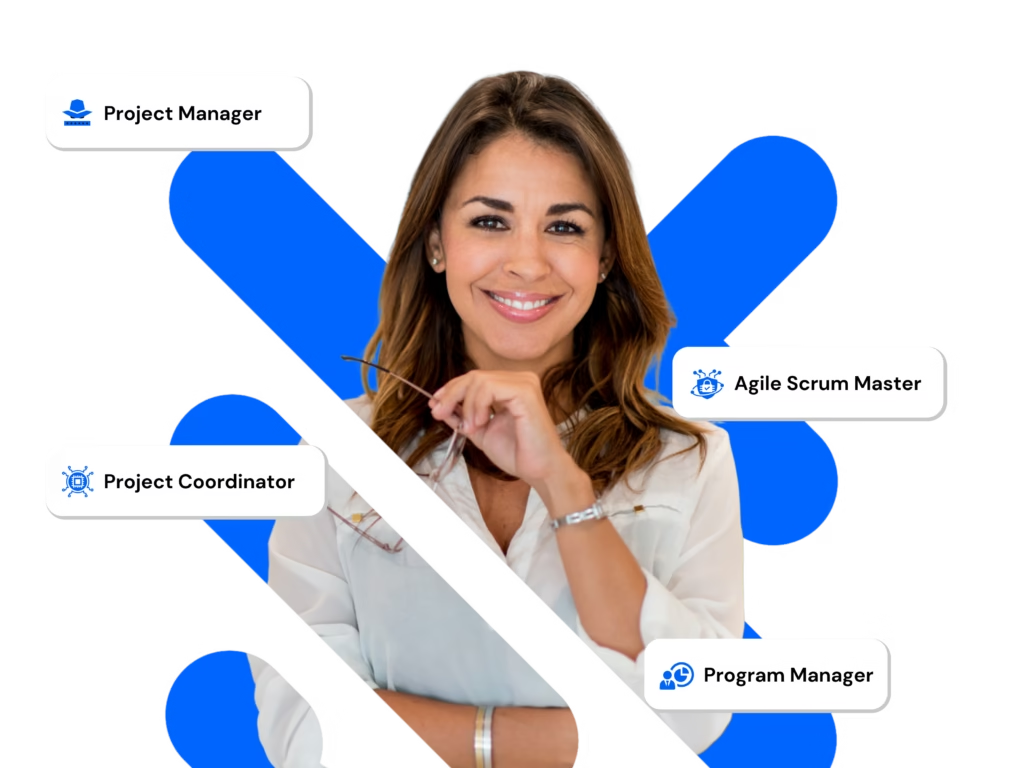Gen AI & Machine Learning are Game Changers, It’s a fact now, AI & Machine Learning Certification are game-changers. AI is no longer the future; it’s here now. These Cert’s are bringing about a new era of creativity and productivity, from automating software development to transforming industry, banking, education, and entertainment. However, the need for qualified experts who can develop, oversee, and responsibly use new technologies is just as critical as the rapid advancement of these technologies.
In this article, you will explore why certifications in generative AI and machine learning are becoming increasingly important in today’s technologically advanced job market. You will discover how they reduce the skills gap, improve employability, and offer practical experience that companies genuinely appreciate. We will also discuss how AI is changing sectors, the technical and soft skills you will need along the road, and the job options that become available following certification. This guide will show you how the correct certification may advance your career and future-proof your success, regardless of whether you’re a professional looking to upskill or a student interested in AI.
Table of Contents
Growing demand for Generative AI and Machine Learning Certification

The increasing impact of artificial intelligence is changing how businesses operate across industries and the global labor market. As AI keeps automating tasks and optimizing processes, there is a growing need for qualified individuals in positions like machine learning experts, data scientists, and AI engineers. Faster decision-making, increased productivity, and creative solutions provide businesses that use AI a competitive edge over those that are unwilling to change. According to Forbes’ The Future of Work 2030 report, automation may replace millions of traditional jobs, highlighting the urgent need for professionals to obtain AI certifications and upskill. In addition to closing the growing skill gap, obtaining these certificates equips people to prosper in a changing, technologically advanced industry.
- The need for AI professionals is growing as positions like machine learning expert, data scientist, and AI engineer are among the most in-demand in the labor market right now.
- Business Transformation: In sectors like manufacturing, healthcare, and finance, artificial intelligence is fostering innovation, automation, and efficiency.
- Skill Gap Challenge: By 2030, automation may displace millions of traditional occupations, necessitating the urgent adoption of AI-focused skill development.
- Competitive Advantage: Businesses using AI have a major advantage over those using antiquated techniques because they make decisions more quickly. Gaining an AI certification helps professionals stay relevant in a market that is changing quickly, boosts their credibility, and opens up lucrative career paths.
How Generative AI Benefits the Industry Sector

1 Software Development
Companies are adopting AI for code review, debugging, and optimization, reducing delivery cycles. It helps with documentation creation and enhances code quality. Developer productivity can be increased by using AI-powered tools that can convert user requirements into usable code. GitHub Copilot users report a 55% productivity boost in real-world projects, AI-powered assistants can now convert user prompts into functional code with remarkable accuracy. Teams are using AI consistently to deliver software 30–40% faster than traditional workflows. This shift shows that mastering AI-driven tools is becoming a core software skill for the future.
2 Banking and Finance
The generative AI generates financial reporting, fraud detection algorithms, and risk evaluations to assist in the banking industry. It has the ability to automate consumer communications, including notifications and tailored advice. AI provides quicker and more precise financial insights and supports trading strategies, portfolio optimization, and predictive analytics.
Predictive analytics, fraud detection, and risk modeling are some of the ways that generative AI is revolutionizing finance.
AI is already being used by 56% of financial institutions to avoid fraud, according to Deloitte. Real-time AI models evaluate millions of transactions, increasing detection accuracy by more than 80%. JPMorgan and other banks spend $2 billion a year on AI to optimize their portfolios and trade.
Continue Reading 10 Machine Learning Algorithms you should Know
3 Manufacturing and Supply Chain
By forecasting equipment maintenance requirements, modeling production procedures, and improving product design, generative AI helps manufacturing. It may improve logistics planning, optimize inventory management, and provide demand projections in supply chains, all of which lower costs and boost operational effectiveness. Automation driven by AI is simplifying shipping and manufacturing worldwide. Generative AI reduces equipment downtime by 30% by anticipating maintenance needs. Using virtual models, it improves product design while significantly reducing prototyping expenses. Real-time tracking and demand forecasting powered by AI are advantageous for supply chains. Up to 50% more deliveries are made by businesses that use AI logistics. This technology reduces pollutants and material waste, which contributes to sustainability. AI use by manufacturers is resulting in three times greater productivity increase than rivals.
4- Recruiting and HR
Generative AI in human resources facilitates hiring by creating job descriptions, reviewing resumes, and even conducting preliminary interviews. It helps improve staff planning, suggest training courses, and forecast losses by analyzing employee data. Through the automation of hiring, analysis, and employee engagement, generative AI is revolutionizing human resources. AI can screen thousands of resumes in a matter of seconds, increasing hiring efficiency. It also forecasts trends in employee turnover and produces objective job descriptions. AI chatbots are used by recruiters to perform candidate evaluations and initial interviews. Finding skill gaps and recommending individualized training are made easier. This allows HR specialists to concentrate on retention, strategy, and culture.
5-Ecommerce
By producing dynamic marketing content, automated ad copy, and personalized product suggestions, generative AI improves e-commerce. It can create lifelike product photos, mimic virtual try-ons, and improve pricing strategies. By offering real-time customer service, AI chatbots raise engagement and conversion rates. It creates dynamic pricing as well as excellent product descriptions and images. Three-dimensional product visualization and virtual try-on greatly increase buyer confidence. Big e-commerce companies like Shopify and Amazon employ AI to streamline their logistics and inventories.
Consumer questions are currently handled by AI chatbots worldwide. Using generative design technologies, brands may stay consistent across their campaigns.
Also visit Top 10 AI Tools you should learn today
Key Reasons why Generative AI and ML Certifications are valuable-
1 Enhanced Employability
Earning a certification in generative AI shows your proficiency to hiring managers. It shows that you’ve put in the time and effort to become proficient with the technology, which makes you an appealing candidate for jobs involving artificial intelligence. Getting certified can be crucial to securing your dream job as more businesses use AI for automation and creativity. Generative AI and Machine Learning certifications now serve as major career boosters in our digital economy. LinkedIn’s Future of Work Report 2025 shows AI-related job listings have increased by over 40% compared to last year, with certified applicants getting shortlisted almost twice as often as those without certifications.
2 High Demand for AI Skills
A wide range of industries, including healthcare, entertainment, finance, and education, use generative AI. Professionals with expertise in AI technology are in high demand as a result of this broad use. Being certified shows that you are prepared to contribute to AI-driven projects and makes you stand out in an increasingly competitive field. Skill Validation- A certification can prove your expertise in cutting-edge AI tools like Large Language Models (LLMs) and Generative Adversarial Networks (GANs). Employers can see that you can manage complex AI frameworks and use them successfully in practical situations. AI is evolving quickly, with new technologies and tools emerging on a regular basis. Getting a top generative AI certification guarantees that you keep up with the most recent developments and remain relevant in this rapidly evolving industry.
3 Increased Potential for Earnings and Career Advancement
Certified AI specialists make more money than their colleagues who are not certified. Gaining a generative AI certification makes you an expert in an area that is in great demand, which can lead to profitable prospects. For instance, based on experience and skill, AI developers in the US can make anywhere from $100,000 to $200,000 annually.
Whether you want to work in application design, research, or development of AI, certification can help you advance your career more quickly. Candidates who actively update their skills and show an understanding of emerging technologies are valued by employers, and this can result in promotions and additional responsibilities.
4 Ethical Use of AI
Ethical AI reduces bias, discrimination, and unforeseen harm by ensuring that AI systems are developed and applied properly. In AI-driven decision-making, it encourages openness, responsibility, and equity. By sticking to ethical standards, companies can gain the trust of stakeholders and users. In order to develop technologies that benefit society while protecting human rights, ethical AI must be given top priority.
Read ai-and-machine-learning-whats-the-difference
AI integration with other Technologies

AI and Cloud Computing
AI and Cloud computing integration enables companies to implement models at scale without making significant investments in physical infrastructure. The learners who obtain certifications are better equipped to train, deploy, and manage AI models effectively using cloud platforms. Cloud-based AI services, such as automated machine learning, data storage, and processing power, are used by professionals. This makes AI applications highly available, cheaper, and allows for quicker experimentation. Acquiring these abilities guarantees the scalability, adaptability, and ease of maintenance of AI solutions across industries.
Artificial intelligence and IoT
IoT and AI work together to analyze data in real time from sensors and connected devices. Certifications offer practical experience in combining IoT networks and AI algorithms for intelligent decision-making and predictive analytics. Experts acquire the skills necessary to create systems that automatically optimize performance, monitor procedures, and identify irregularities. Smart manufacturing, healthcare monitoring, and smart city solutions all depend on this connection. A thorough understanding of the AI-IoT synergy guarantees efficient data use for increased productivity and creativity.
Automation and Artificial Intelligence
AI-powered automation enables companies to decrease human participation in workflows and speed up repetitive tasks. With the help of certifications, students may deploy AI systems that improve workflow, boost output, and reduce errors. Experts learn how to use AI to automate operational, data processing, and customer service operations. Faster turnaround times, lower costs, and increased overall efficiency result from this. Gaining knowledge of AI automation approaches equips professionals to create intelligent systems that enhance human labor.
Career Path you can pursue after certification
AI Engineer
Artificial Intelligence (AI) engineers create and deploy intelligent systems that are capable of data analysis, prediction, and decision-making automation. They work on training algorithms, creating machine learning models, and implementing AI solutions on various platforms. Their hands-on expertise with TensorFlow, PyTorch, and cloud-based AI technologies is facilitated by their certifications. Professionals that want to develop in domains like automation, robots, and data intelligence would thrive in this capacity.
Machine Learning (ML) and Developer-
The goal of machine learning developers is to build models that let computers learn and adapt without the need for direct programming. To address real-world issues, they employ model optimization, data pipelines, and algorithms. Neural networks, supervised and unsupervised learning, and model evaluation are among the fundamental methods taught in certification programs. With these abilities, ML developers are essential to sectors like e-commerce, healthcare, and finance.
Prompt Engineer
Generative AI tools like ChatGPT, DALL·E, or Midjourney is the specialty of prompt engineers. They know how to interact with LLMs to generate precise, imaginative, and moral answers. Professionals are prepared for this new and in-demand position with certifications in generative AI and LLMs. Prompt engineering is becoming crucial in the design, marketing, and educational domains as AI-generated content increases.
Consultant for AI-
AI consultants help companies implement AI solutions that support their business goals. They evaluate AI-driven changes, assess current procedures, and suggest appropriate technology. By promoting the development of both technical proficiency and commercial savvy, certification empowers consultants to convert AI’s promise into quantifiable results. For businesses hoping to develop effectively and responsibly, this position is essential.
Data analysts
Assist firms in making data-driven decisions by gathering, cleaning, and interpreting huge datasets. They can automate difficult data chores and employ machine learning techniques for predictive analytics after acquiring an AI certification. Additionally, they learn how to use AI-model-integrated platforms like Tableau or Power BI for reporting and visualization. For maximizing corporate intelligence and strategy, they are invaluable due to their certification-backed competence.
Senseacademy
At SenseAcademy, our Machine Learning with Python course introduces the foundations of utilizing Python programming to apply machine learning techniques. In addition to covering essential concepts like data pre-processing, model training, assessment, and deployment, the course offers students practical experience with popular libraries like scikit-learn and TensorFlow. Students acquire useful skills in creating and evaluating models, putting supervised and unsupervised algorithms into practice, and drawing insightful conclusions from data. By the end of the course, participants will have the skills necessary to effectively address real-world problems, improve their employability, and confidently enter AI-focused and data-driven professions in a variety of industries, including software development, finance, and education.
Visit Mastering Microsoft Certified Azure AI Engineer AI 102
FAQ’s
What is generative AI and machine learning certification?
It is a structured program that teaches you how to create, use, and oversee AI and ML models. Practical projects and real-world case studies are frequently a part of certifications. In addition to validating your abilities, they also get you ready for real-world industry challenges. You also learn how to efficiently use well-known AI tools and frameworks. As a result, you are prepared for positions in data-driven, software, and AI industries. All things considered, it gives students both applied expertise and knowledge.
Who can benefit from certificates in AI and Machine Learning?
The benefits are significant for beginners as well as professionals. For beginners, there is guided projects, foundational knowledge, and structured learning. Experts can change occupations, improve their present positions, or upskill. Everyone who wants to work in AI, data analytics, or similar fields can benefit from it. A certification can help non-technical workers move into AI roles. All things considered, it provides resources for future-proofing abilities and job advancement.
Which industries are making the most use of generative AI?
Globally, generative AI is being accepted by a number of industries. The industries with the highest usage are manufacturing, finance, and software development. AI is also used in media, HR, e commerce, and education to increase productivity and creativity. It facilitates task automation, improves decision-making, and speeds up innovation for businesses. Adoption of AI is turning becoming a competitive advantage in nearly every sector. Thus, professionals with AI expertise are highly sought after in a variety of industries.
How do certifications improve career opportunities?
Certifications offer authentic evidence of your proficiency in AI and ML. They increase your employability by demonstrating that you possess abilities that are relevant to the industry. Assessments and practical projects get you ready for problems in the real world. Certified professionals are valued by employers for their practical knowledge and credibility. They may result in increased pay, job advancement, and access to international prospects. All things considered, accreditation offers you a competitive advantage in a rapidly expanding industry.
What skills can a certification in generative AI and machine learning give me?
You will learn technical abilities including data analysis, coding, and AI modeling.
Practical projects that allow you to put what you’ve learned into practice are part of certifications. Soft skills like creativity, adaptability, and problem-solving are also developed. You’ll gain confidence with AI frameworks, tools, and new technologies. These abilities equip you for positions in a variety of fields and job duties. All things considered, certification gives you both practical expertise and knowledge.





